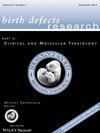María Paz Bidondo, Boris Groisman, Agostina Tardivo, Fabián Tomasoni, Verónica Tejeiro, Inés Camacho, Mariana Vilas, Rosa Liascovich, Pablo Barbero
下载PDF
{"title":"双足虫:系统回顾并报告两例","authors":"María Paz Bidondo, Boris Groisman, Agostina Tardivo, Fabián Tomasoni, Verónica Tejeiro, Inés Camacho, Mariana Vilas, Rosa Liascovich, Pablo Barbero","doi":"10.1002/bdra.23549","DOIUrl":null,"url":null,"abstract":"<div>\n \n <section>\n \n <h3> Background</h3>\n \n <p>Diprosopus is a subtype of symmetric conjoined twins with one head, facial duplication and a single trunk. Diprosopus is a very rare congenital anomaly.</p>\n </section>\n \n <section>\n \n <h3> Methods</h3>\n \n <p>This is a systematic review of published cases and the presentation of two new cases born in Argentina. We estimated the prevalence of conjoined twins and diprosopus using data from the National Network of Congenital Anomalies of Argentina (RENAC).</p>\n </section>\n \n <section>\n \n <h3> Results</h3>\n \n <p>The prevalence of conjoined twins in RENAC was 19 per 1,000,000 births (95% confidence interval, 12–29). Diprosopus prevalence was 2 per 1,000,000 births (95% confidence interval, 0.2–6.8). In the systematic review, we identified 31 diprosopus cases. The facial structures more frequently duplicated were nose and eyes. Most frequent associated anomalies were: anencephaly, duplication of cerebral hemispheres, craniorachischisis, oral clefts, spinal abnormalities, congenital heart defects, diaphragmatic hernia, thoracic and/or abdominal visceral laterality anomalies. One of the RENAC cases and three cases from the literature had another discordant nonmalformed twin.</p>\n </section>\n \n <section>\n \n <h3> Conclusion</h3>\n \n <p>The conjoined twins prevalence was similar to other studies. The prevalence of diprosopus was higher. The etiology is still unknown. The presence of visceral laterality anomalies may indicate the link between diprosopus and the alteration or duplication of the primitive node in the perigastrulation period (12–15 days postfertilization). Pregnancies of more than two embryos may be a risk factor for diprosopus. Given the low prevalence of this defect, it would be useful to perform studies involving several surveillance systems and international consortiums. Birth Defects Research (Part A), 2016. © 2016 Wiley Periodicals, Inc. Birth Defects Research (Part A) 106:993–1007, 2016. © 2016 Wiley Periodicals, Inc.</p>\n </section>\n </div>","PeriodicalId":8983,"journal":{"name":"Birth defects research. Part A, Clinical and molecular teratology","volume":"106 12","pages":"993-1007"},"PeriodicalIF":0.0000,"publicationDate":"2016-10-05","publicationTypes":"Journal Article","fieldsOfStudy":null,"isOpenAccess":false,"openAccessPdf":"https://sci-hub-pdf.com/10.1002/bdra.23549","citationCount":"16","resultStr":"{\"title\":\"Diprosopus: Systematic review and report of two cases\",\"authors\":\"María Paz Bidondo, Boris Groisman, Agostina Tardivo, Fabián Tomasoni, Verónica Tejeiro, Inés Camacho, Mariana Vilas, Rosa Liascovich, Pablo Barbero\",\"doi\":\"10.1002/bdra.23549\",\"DOIUrl\":null,\"url\":null,\"abstract\":\"<div>\\n \\n <section>\\n \\n <h3> Background</h3>\\n \\n <p>Diprosopus is a subtype of symmetric conjoined twins with one head, facial duplication and a single trunk. Diprosopus is a very rare congenital anomaly.</p>\\n </section>\\n \\n <section>\\n \\n <h3> Methods</h3>\\n \\n <p>This is a systematic review of published cases and the presentation of two new cases born in Argentina. We estimated the prevalence of conjoined twins and diprosopus using data from the National Network of Congenital Anomalies of Argentina (RENAC).</p>\\n </section>\\n \\n <section>\\n \\n <h3> Results</h3>\\n \\n <p>The prevalence of conjoined twins in RENAC was 19 per 1,000,000 births (95% confidence interval, 12–29). Diprosopus prevalence was 2 per 1,000,000 births (95% confidence interval, 0.2–6.8). In the systematic review, we identified 31 diprosopus cases. The facial structures more frequently duplicated were nose and eyes. Most frequent associated anomalies were: anencephaly, duplication of cerebral hemispheres, craniorachischisis, oral clefts, spinal abnormalities, congenital heart defects, diaphragmatic hernia, thoracic and/or abdominal visceral laterality anomalies. One of the RENAC cases and three cases from the literature had another discordant nonmalformed twin.</p>\\n </section>\\n \\n <section>\\n \\n <h3> Conclusion</h3>\\n \\n <p>The conjoined twins prevalence was similar to other studies. The prevalence of diprosopus was higher. The etiology is still unknown. The presence of visceral laterality anomalies may indicate the link between diprosopus and the alteration or duplication of the primitive node in the perigastrulation period (12–15 days postfertilization). Pregnancies of more than two embryos may be a risk factor for diprosopus. Given the low prevalence of this defect, it would be useful to perform studies involving several surveillance systems and international consortiums. Birth Defects Research (Part A), 2016. © 2016 Wiley Periodicals, Inc. Birth Defects Research (Part A) 106:993–1007, 2016. © 2016 Wiley Periodicals, Inc.</p>\\n </section>\\n </div>\",\"PeriodicalId\":8983,\"journal\":{\"name\":\"Birth defects research. Part A, Clinical and molecular teratology\",\"volume\":\"106 12\",\"pages\":\"993-1007\"},\"PeriodicalIF\":0.0000,\"publicationDate\":\"2016-10-05\",\"publicationTypes\":\"Journal Article\",\"fieldsOfStudy\":null,\"isOpenAccess\":false,\"openAccessPdf\":\"https://sci-hub-pdf.com/10.1002/bdra.23549\",\"citationCount\":\"16\",\"resultStr\":null,\"platform\":\"Semanticscholar\",\"paperid\":null,\"PeriodicalName\":\"Birth defects research. Part A, Clinical and molecular teratology\",\"FirstCategoryId\":\"1085\",\"ListUrlMain\":\"https://onlinelibrary.wiley.com/doi/10.1002/bdra.23549\",\"RegionNum\":0,\"RegionCategory\":null,\"ArticlePicture\":[],\"TitleCN\":null,\"AbstractTextCN\":null,\"PMCID\":null,\"EPubDate\":\"\",\"PubModel\":\"\",\"JCR\":\"Q\",\"JCRName\":\"Medicine\",\"Score\":null,\"Total\":0}","platform":"Semanticscholar","paperid":null,"PeriodicalName":"Birth defects research. Part A, Clinical and molecular teratology","FirstCategoryId":"1085","ListUrlMain":"https://onlinelibrary.wiley.com/doi/10.1002/bdra.23549","RegionNum":0,"RegionCategory":null,"ArticlePicture":[],"TitleCN":null,"AbstractTextCN":null,"PMCID":null,"EPubDate":"","PubModel":"","JCR":"Q","JCRName":"Medicine","Score":null,"Total":0}
引用次数: 16
引用
批量引用

 求助内容:
求助内容: 应助结果提醒方式:
应助结果提醒方式:


